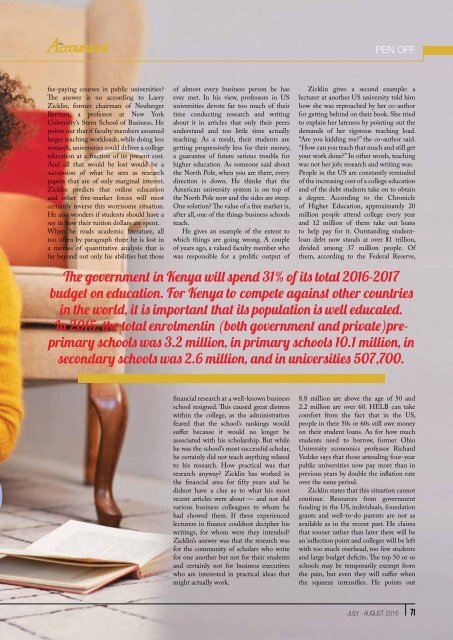The-Accountant-Jul-Aug-2016
You also want an ePaper? Increase the reach of your titles
YUMPU automatically turns print PDFs into web optimized ePapers that Google loves.
PEN OFF<br />
fee-paying courses in public universities?<br />
<strong>The</strong> answer is no according to Larry<br />
Zicklin, former chairman of Neuberger<br />
Berman, a professor at New York<br />
University’s Stern School of Business. He<br />
points out that if faculty members assumed<br />
larger teaching workloads, while doing less<br />
research, universities could deliver a college<br />
education at a fraction of its present cost.<br />
And all that would be lost would be a<br />
succession of what he sees as research<br />
papers that are of only marginal interest.<br />
Zicklin predicts that online education<br />
and other free-market forces will most<br />
certainly reverse this worrisome situation.<br />
He also wonders if students should have a<br />
say in how their tuition dollars are spent.<br />
When he reads academic literature, all<br />
too often by paragraph three he is lost in<br />
a morass of quantitative analysis that is<br />
far beyond not only his abilities but those<br />
of almost every business person he has<br />
ever met. In his view, professors in US<br />
universities devote far too much of their<br />
time conducting research and writing<br />
about it in articles that only their peers<br />
understand and too little time actually<br />
teaching. As a result, their students are<br />
getting progressively less for their money,<br />
a guarantee of future serious trouble for<br />
higher education. As someone said about<br />
the North Pole, when you are there, every<br />
direction is down. He thinks that the<br />
American university system is on top of<br />
the North Pole now and the sides are steep.<br />
One solution? <strong>The</strong> value of a free market is,<br />
after all, one of the things business schools<br />
teach.<br />
He gives an example of the extent to<br />
which things are going wrong. A couple<br />
of years ago, a valued faculty member who<br />
was responsible for a prolific output of<br />
Zicklin gives a second example: a<br />
lecturer at another US university told him<br />
how she was reproached by her co-author<br />
for getting behind on their book. She tried<br />
to explain her lateness by pointing out the<br />
demands of her rigorous teaching load.<br />
“Are you kidding me?” the co-author said.<br />
“How can you teach that much and still get<br />
your work done?” In other words, teaching<br />
was not her job; research and writing was.<br />
People in the US are constantly reminded<br />
of the increasing cost of a college education<br />
and of the debt students take on to obtain<br />
a degree. According to the Chronicle<br />
of Higher Education, approximately 20<br />
million people attend college every year<br />
and 12 million of them take out loans<br />
to help pay for it. Outstanding studentloan<br />
debt now stands at over $1 trillion,<br />
divided among 37 million people. Of<br />
them, according to the Federal Reserve,<br />
<strong>The</strong> government in Kenya will spend 31% of its total <strong>2016</strong>-2017<br />
budget on education. For Kenya to compete against other countries<br />
in the world, it is important that its population is well educated.<br />
In 2015, the total enrolmentin (both government and private)preprimary<br />
schools was 3.2 million, in primary schools 10.1 million, in<br />
secondary schools was 2.6 million, and in universities 507,700.<br />
financial research at a well-known business<br />
school resigned. This caused great distress<br />
within the college, as the administration<br />
feared that the school’s rankings would<br />
suffer because it would no longer be<br />
associated with his scholarship. But while<br />
he was the school’s most successful scholar,<br />
he certainly did not teach anything related<br />
to his research. How practical was that<br />
research anyway? Zicklin has worked in<br />
the financial area for fifty years and he<br />
didnot have a clue as to what his most<br />
recent articles were about — and nor did<br />
various business colleagues to whom he<br />
had showed them. If these experienced<br />
lecturers in finance couldnot decipher his<br />
writings, for whom were they intended?<br />
Zicklin’s answer was that the research was<br />
for the community of scholars who write<br />
for one another but not for their students<br />
and certainly not for business executives<br />
who are interested in practical ideas that<br />
might actually work.<br />
8.8 million are above the age of 50 and<br />
2.2 million are over 60. HELB can take<br />
comfort from the fact that in the US,<br />
people in their 50s or 60s still owe money<br />
on their student loans. As for how much<br />
students need to borrow, former Ohio<br />
University economics professor Richard<br />
Vedder says that those attending four-year<br />
public universities now pay more than in<br />
previous years by double the inflation rate<br />
over the same period.<br />
Zicklin states that this situation cannot<br />
continue. Resources from government<br />
funding in the US, individuals, foundation<br />
grants and well-to-do parents are not as<br />
available as in the recent past. He claims<br />
that sooner rather than later there will be<br />
an inflection point and colleges will be left<br />
with too much overhead, too few students<br />
and large budget deficits. <strong>The</strong> top 50 or so<br />
schools may be temporarily exempt from<br />
the pain, but even they will suffer when<br />
the squeeze intensifies. He points out<br />
JULY - AUGUST <strong>2016</strong> 71

















